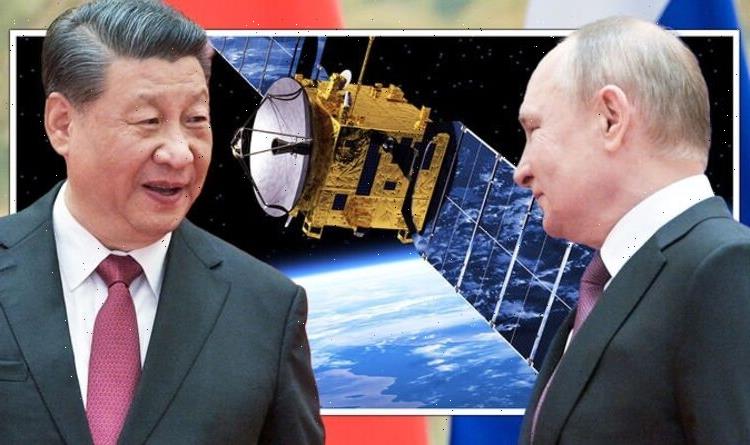Space debris has been found in earth's orbit says expert
We use your sign-up to provide content in ways you’ve consented to and to improve our understanding of you. This may include adverts from us and 3rd parties based on our understanding. You can unsubscribe at any time. More info
Antonio Weiss, a digital transformation specialist, has been working with The UK Space Agency to develop a digital programme that can detect and track the vast quantity of material currently orbiting Earth. And he warned the problem was “the very definition of a global issue”, with a small number of collisions having the potential to “render the majority of near-Earth space unusable”.
Meanwhile, Jacob Geer, Head of Space Surveillance and Tracking at the UK Space Agency stressed while removing space junk orbiting the planet was difficult it was “not impossible” – and floated the idea of launching special anti-debris satellites from UK spaceports in the future.
Mr Weiss told Express.co.uk: “A collision between a satellite and another object can be catastrophic, even the smallest pieces of debris can cause huge damage when it’s flying at a satellite at several kilometres a second.”
Citing the 2009 Iridium crash, involving a collision between US and Russian satellites, as an example, he added: “When a crash occurs it creates a cloud of thousands of debris fragments that spread out across the environment, creating chaos for other satellites and reducing the area of clean orbits for new satellites.”
With satellites already extremely expensive to build, launch and operate, keeping them clear of random pieces of junk was similarly difficult and expensive, taking up valuable time and energy which the international community would prefer to put into something more productive, Mr Weiss stressed.

He said: “It’s this knock-on effect, of clouds of debris and endangering other functioning objects in orbit, which make this the very definition of a global issue.
“Not only this, but it would only take a few more incidents like the 2009 Iridium crash to render the majority of near-Earth space unusable.”
Overall, according to the European Space Agency (ESA), there are currently more than 9,000 tonnes of space debris orbiting the Earth, including a Chinese rocket due to crash into the Moon’s surface next month.
As for the UK’s role, Mr Weiss said: “Up until now the American’s have been leading the way with programmes like these, with the US Space Force promising to be the most proactive due to the security issues space debris can hold from other countries like Russia.

“But, in terms of pioneering the nuts and bolts of the technology, the UK is by far the most proactive.”
He explained: “Within the clean-up operation headed by the International Space Station, it’s a British made satellite (made by Surrey Satellite Technology Limited) that is equipped with a harpoon and net, which will test a system for capturing large pieces of space junk.
“At the end of its mission, it will unfurl a drag sail to slow its speed, bringing itself and the captured debris out of orbit, where it will burn up as it enters the atmosphere.”
The UK also has two of its own large programmes to further develop this kind of research with Astroscale and Clearspace launched this year to keep satellite orbit paths clear and run reconnaissance and recovery on large pieces of space debris which could potentially be recycled or reused.
DON’T MISS
EU’s Galileo placed on red after Russia’s ‘reckless’ missile test [REPORT]
RAF sets Guinness World Record with first flight on synthetic fuel [LATEST]
Look up! Leonid meteor shower to light up UK’s skies this week [INSIGHT]

Referring to his own project, Mr Weiss said: “The software developed by The PSC team uses data from orbital analytics to calculate the likelihood of collisions in space, and notifies satellite operators with any threats in real-time.
“This means operators are able to adjust their satellite’s course accordingly to avoid any potential crashes – such as China did recently when they pulled a defunct navigation satellite out of the path of other satellites.
“This is all aimed at making the space sector a safer place within which to operate.”
There were significant logistical challenges, he acknowledged, especially because nobody territorially “owns” space, meaning it could be difficult to convince organisations to clean up after themselves.

Mr Weiss said: “Our programme plays a crucial role by mapping and predicting where space junk will be at any given time, enabling the international community to swing into action.”
Mr Geer told Express.co.uk: “Removing debris from orbit is difficult but not impossible, which is why we are seeing several companies and space agencies developing ways of doing this.
“The UK has, with the RemoveDebris mission, already demonstrated various ways of capturing debris in orbit, such as using nets or even harpoons. The challenge now is to make the service work commercially and target more dangerous debris.”
He stressed the UK was at the “leading edge”, with the first missions likely to reach space by the middle of the decade.

Mr Geer said: “Last year, UK Space Agency awarded funding to prepare the initial phases of a UK-led mission to clean up orbit by removing multiple old satellites. This mission supports the government’s ambitions to be a leading nation in space sustainability.”
The UKSA was exploring a number of options including the launch of new satellites, Mr Geer explained.
He added: “One key thing we can do now is better track and avoid debris, which requires analysis and data from here on earth.
“Missions like this could be launched from UK spaceports in the years to come. UK spaceports typically aim to reach parts of low earth orbit, a region of space where there is already a major problem with space debris.”
Source: Read Full Article
